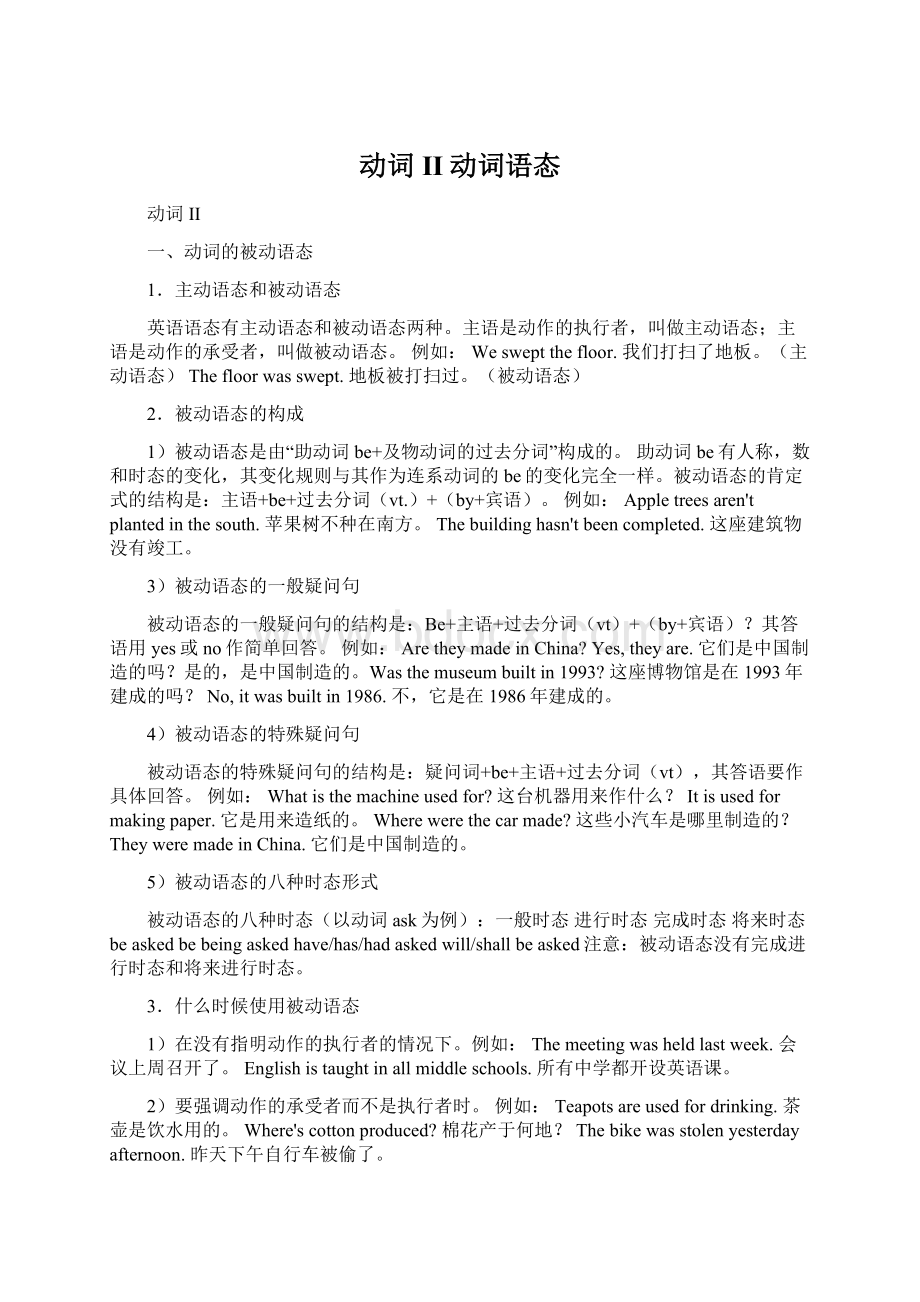动词II动词语态Word下载.docx
《动词II动词语态Word下载.docx》由会员分享,可在线阅读,更多相关《动词II动词语态Word下载.docx(14页珍藏版)》请在冰豆网上搜索。

Yes,theyare.它们是中国制造的吗?
是的,是中国制造的。
Wasthemuseumbuiltin1993?
这座博物馆是在1993年建成的吗?
No,itwasbuiltin1986.不,它是在1986年建成的。
4)被动语态的特殊疑问句
被动语态的特殊疑问句的结构是:
疑问词+be+主语+过去分词(vt),其答语要作具体回答。
Whatisthemachineusedfor?
这台机器用来作什么?
Itisusedformakingpaper.它是用来造纸的。
Wherewerethecarmade?
这些小汽车是哪里制造的?
TheyweremadeinChina.它们是中国制造的。
5)被动语态的八种时态形式
被动语态的八种时态(以动词ask为例):
一般时态进行时态完成时态将来时态beaskedbebeingaskedhave/has/hadaskedwill/shallbeasked注意:
被动语态没有完成进行时态和将来进行时态。
3.什么时候使用被动语态
1)在没有指明动作的执行者的情况下。
例如:
Themeetingwasheldlastweek.会议上周召开了。
Englishistaughtinallmiddleschools.所有中学都开设英语课。
2)要强调动作的承受者而不是执行者时。
Teapotsareusedfordrinking.茶壶是饮水用的。
Where'
scottonproduced?
棉花产于何地?
Thebikewasstolenyesterdayafternoon.昨天下午自行车被偷了。
4.主动语态变为被动语态的方法
1)将主动句里的宾语成分变为被动句里的主语成分。
把主动句里的宾格人称代词改为主格形式。
2)把主动结构的谓语动词改为be+过去分词形式。
3)将主动句的主语变为介词by的宾语。
Peopleuseradiosforlisteningtothenews.(主动)→Radiosareuseforlisteningtothenewsbypeople.(被动)Ipostedaletterlastweek.(主动)→Aletterwaspostedbymelastweek.(被动)注意:
在make,let,see,hear,notice,watch,feel等动词后面作宾语补足语的动词不定式都不带to,但这种句子如果变为被动语态时,则应加上to。
WeheardhersinganEnglishsong.(主动)→ShewasheardtosinganEnglishsongbyus.(被动)
5.主动语态变为被动语态的主要类型
1)谓语动词只有一个宾语的。
Theworkersarebuildingaship.(主动语态)→Theshipisbeingbuiltbytheworkers.(被动语态)Ihavefinishedtheexercises.(主动语态)→Theexerciseshavebeenfinishedbyme.(被动语态)
2)谓语动词有两个宾语的,其中一个变为被动句的主语,另一个仍作为宾语,称为保留宾语。
Isenthimapresent.(主动语态)→Hewassentapresentbyme.(被动语态)Apresentwassenttohimbyme.(被动语态)
注意:
a)在主动句中有些动词,如ask,answer,teach等变成被动句时,一般将间接宾语(指人的)改成被动句的主语。
Heaskedusalotofquestions.(主动语态)→Wewereaskedalotofquestionsbyhim.
b)在主动句中有些动词,如build,buy,choose等变成被动句时,将直接宾语(指物的)改成被动句的主语。
Myfatherboughtmeanewbike.(主动语态)→Thenewbikewasboughtformebymyfather.(被动语态)
3)谓语动词后跟复合宾语,只把宾语改为被动句的主语,宾语补足语不变。
宾语宾补Heleftthedooropen.(主动语态)他让门开着。
→Thedoorwasleftopenbyhim.(被动语态)门由他打开着。
4)许多由不及物动词加介词构成的短语动词,相当于一个及物动词,可以有宾语,因而也可以有被动语态。
但应注意:
短语动词是一个不可分割的整体,在变为被动语态时,不可丢掉构成短语动词的介词或副词。
Wemusttakegoodcareofourbooks.(主动语态)→Ourbooksmustbetakengoodcareof.(被动语态)我们应该保管好我们的书本。
我们的书本应保管好。
(被动)
5)谓语动词含有情态动词时,只变及物动词为被动语态,构成为:
情态动词+be+过去分(vt.)
Wemustfinishitatonce.(主动语态)我们必须马上做完这件事。
→Itmustbefinishedatonce(被动语态)这件事必须马上做完。
6)带有begoingto结构的被动语态,被动结构表现在不定式上。
结构为:
sthbegoingtobedone。
Iamgoingtoclosethedoor.(主动语态)我将去关门。
→Thedoorisgoingtobeclosed.(被动语态)门将要关上。
6.被动语态中应注意的几个问题
1)在被动语态句子中要注意主语与谓语在人称和数方面要保持一致。
2)主动语态不能变为被动语态的情况:
a.have(有)以及和have构成的短语动词不能用于被动语态b.不及物动词没有动作的承受者,不能用被动语态。
c.主动句的宾语是eachother或反身代词时,不能变成被动句的主语。
d.主动句的宾语是不定式或动词的-ing形式时,不能变成被动句的主语。
3)注意有时用主动语态表示被动意义的情况。
Thiskindofclothwashesverywell.这种布很禁洗。
ThemachinemadeinChinasellwellabroad.中国制造的机器在国外畅销。
二、动词不定式
不定式是动词的一种非限定形式,通常前面带有小品词to,动词不定式的基本形式由“to+动词原形”构成,有时也可以省略to。
不定式可以有自己的宾语或状语。
带有宾语或状语的不定式叫不定式短语。
1.不定式在句子中的作用
1)作主语例如:
Tolearnaaforeignlanguagewellisnoteasy.学好一门外语不容易。
如果不定式(短语)过长,可用形式主语it,而将真正的主语不定式(短语)放在句末。
Itisbettertoseeoncethantohearahundredtimes.百闻不如一见。
2)作宾语Theyallwantedtoseeyouyesterday.他们昨天都要来看你。
3)作表语Toeatistolive,buttoliveisnottoeat.吃饭是为了活着,但活着不是为了吃饭。
4)作宾语补足语Hewantsyoutocallhimbackateleven.他要你在十一点给他回电话。
Ihelpedhim(to)findhisthings.我帮他找到他的东西。
(help后跟不定式作宾补,可省略to,也可以保留to)注意:
在某些复合宾语中,由于谓语动词的要求,我们往往先用it代表示定式,作为形式宾语,而把真实宾语——不定式放在句子的后面。
这类动词还有make,think等。
Theyfounditimportanttogeteverythingreadyintime.他们发现把一切事情及时准备好很重要。
5)作定语作定语的不定式与经所修饰的名词有逻辑上的动宾关系。
如果这个不定式是不及物动词,它后面就要有必要的介词。
Doyouhaveanythingmoretosay?
你还有什么话要说吗?
Thereisnothingtoworryabout.没有什么值得发愁的。
6)作状语Thechildisnotoldenoughtogotoschool.这个孩子还没到上学年龄。
(结果状语)Theyranovertowelcomeus.他们跑过来欢迎我们。
(目的状语)Tohearthenews,shecried.
听到这个消息后,她哭起来了。
(原因状语)
7)有些动词,如want,like,wish,hope,try,ask,start,learn,agree,teach,decide,understand等,后面可以接连接代词或连接副词加不定式作宾语。
Noonecouldtellmewheretogetthebook.没有人能告诉我哪里能找到这本书。
Showuswhattodo.告诉我们应该做什么。
Idon'
tknowwhethertoanswerhisletter.我不知道要不要给他回信。
3.不定式的时态和语态
不定式有一般式、完成式、进行式,主动式和被动式。
主动形式被动形式一般式todotobedone完成式tohavedonetohavebeendone
进行式tobedoing
1)不定式动作和谓语动作同时发生,这时不定式用进行式。
Theyaresaidtobebuildingahouse.据说他们正在建房子。
2)不定式动作发生在谓语动作之前,这时不定式用完成式。
Iamgoadtohaveseenyourmother.见到你的母亲我很高兴。
3)不定式有主动式和被动式。
不定式的被动式可以用来:
a.作主语Itishappyformetobeaskedtospeakhere.被邀请在这里讲话我很高兴。
b.作宾语Sheaskedtodosenttoworkinthewesternpartofthecountry.她请求派她去西部地区工作。
c.作宾语补足语Hewantedthelettertobewrittenatonce.他让马上把信写好。
d.作状语Shewastooyoungtobegivensomuchmoney.她太小,不能把许多钱给她。
e.作定语Therearealotoftreestobeplanted.有很多树要种。
4.不定式的复合结构不定式的复合结构由“for/of+名词(或代词宾格)+不定式”构成。
其中名词(或代词宾格)表示不定式动作的执行者,是不定式的逻辑主语。
不定式的复合结构在句子中可以作用主语、表语、宾语、定语、状语。
It'
sverykindofyoutohelpus.非常感谢你帮助我们。
(主语)Thisisforyoutodecide.这得由你来决定。
(表语)IthinkitnecessaryforustostudyEnglishhard.我认为我们努力学英语是必要的。
(宾语)Therearealotofdifficultiesforthemtoovercome.有许多困难要他们克服。
(定语)Thetextistoolongforustolearnbyheart.课文太长,我们记不住。
(状语)
随堂监测A组
单项选择:
1.Theno.12bus__________totheTownHallandnottothestation.
A.hascomeB.hasbeengoingC.goesD.isgoing
2.Don'
tusethatpen.It__________smoothly.
A.didn'
twriteB.don'
twriteC.doesn'
twriteD.isn'
twrite
3.Ifit__________,Iwon'
tgoforawalk.
A.rainsB.willrainC.rainedD.rain
4.Thechildisplayingwhilehismother__________dinner.
A.cookedB.cooksC.wascookingD.iscooking
5.He__________inacottonfactorytheseday.
A.isworkingB.worksC.willbeworkingD.hasbeenworking
6.Don'
tturnoffthelightI__________areportnow.
A.havebeenreadingB.readC.amreadingD.haveread
7.John__________thefirstpartyinhislifetomorrownight.
A.isgivenB.isgivingC.hasgivenD.hasbeengiving
8.Myuncle__________toseeme.He'
llbeheresoon.
A.comesB.iscomingC.hadcomeD.came
9.AtthismomentI__________wehaveagoodchanceofvictory.
A.feelB.amfeelingC.feltD.amfelt
10.Myunclenever__________ahateveninwinter.
A.iswearingB.arebeingwornC.woreD.wears
11.BynextDecember,I__________fifty-five.
A.willhavetobeB.willhavebeenC.willbebeingD.shallbe
12.Lookattheseblackclouds__________.
A.It'
llrainB.It'
sgoingtorainC.It'
llberainingD.Itistorain
13.Lookout!
Thattree__________falldown.
A.isgoingtoB.willbeC.shallD.would
14."
HaveyoureadthebookIgaveyou?
"
No,but__________goingtoreaditsoon."
A.I'
dbeB.I'
llbeC.I'
vebeenD.I'
m
15.We__________forShanghaitonight.
A.arestartingB.startsC.startedD.havestarted
16.Ithinkshe__________rightnow.
A.readingB.readsC.isreadingD.read
17.Beforelong,he__________allaboutthematter.
A.willhaveforgottenB.willforgetC.forgetsD.forgot
18.Wedon'
tgounlessyou__________soon.
A.hadcomeB.cameC.hassaidD.hasbeensaying
19.Dobequiet!
I'
mtryingtohearwhattheman__________.
A.saysB.issayingC.hassaidD.hasbeensaying
20.Smith__________hisfriendsformoney.
A.oftenaskB.isoftenaskingC.oftenasksD.hasbeenasked
21.Twelveinches__________onefoot.
A.makeB.makesC.ismakingD.willmake22.WhileConnie__________abaseballmatch,hersisteristypewritingaletterinheroffice.
A.HaswatchedB.watchesC.iswatchingD.hasbeenwatching
23.JamesWatt__________thesteamengine
A.wasinventingB.inventedC.hadinventedD.hasinvented
24."
Thepossibilityofthefloodwasjustreportedovertheradio."
Iknow.Iheardabutit.Theriver__________thetopofitsbank."
A.gotB.getC.getsD.hasgot
25."
Where'
syouruncle'
shome?
__________inBostoninthepastyears.
A.He'
slivedB.He'
slivingC.HelivesD.Helived
26.I__________himalotduringthepasttwoweeks.
A.sawB.haveseenC.hadseenD.amseeing
27.Theycan'
tleaveuntilthey__________theirwork.
A.didB.aredoingC.havedoneD.haddone
28.Willyoupleaselendmethebookwhenyou__________it?
A.willfinishB.havefinishedC.willhavefinishedD.finishing
29.Isthatthefirsttimeyou__________Beijing?
A.havevisitedB.wouldvisitedC.visitedD.havebeenvisiting
30.Shehasworkedinthisfactory__________.
A.after1968B.in1968C.since1968D.for1968
31.__________threeyearssinceIleftschool.NowImissmyclassmateverymuch.
A.ItwasB.IthavebeenC.ItisD.Ithadbeen
32.Myparentshavelivedhere__________.
A.since1952B.formanyyearsagoC.manyyeasagoD.since1952ago
33.Myparentshavelivedhere__________.
A.IthavebeenB.ItisC.ItwasD.Thatis
34.Sofar,she__________herholidayverymuch.
A.hasn'
tenjoyedB.didn'
tenjoyC.doesn'
tenjoyD.wasnotenjoy
35."
Yourarmisbleeding!
"
Yes,I__________itwithaknife."
A.hurtB.washurtingC.havejusthurtD.hadhurt
36.Hisgrandfather__________forthirtyyears.
A.diedB.wasdeadC.hasbeendeadD.hasdied
37.Mybrother__________theYouthLeaguefortwoyears.
A.hasbe